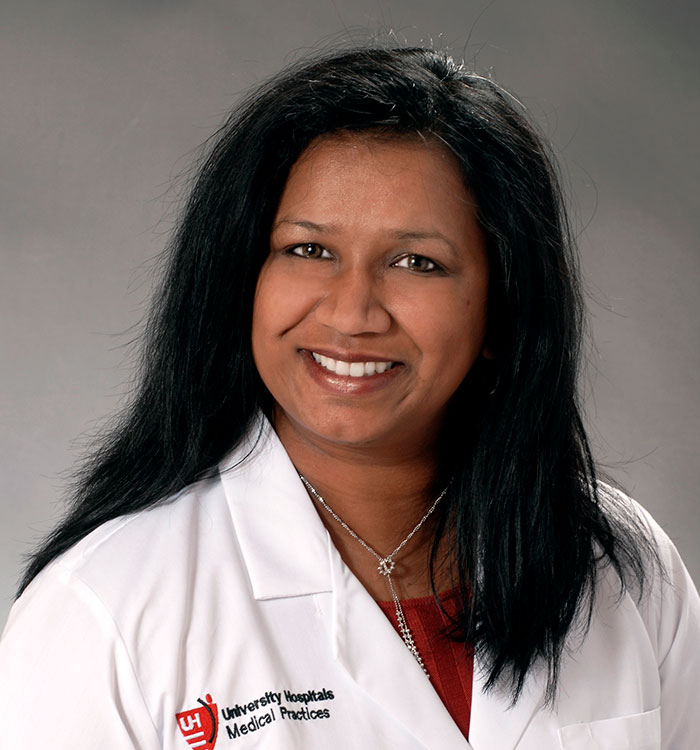Advancements in Bariatric and Foregut Research
February 27, 2023
Innovations in Digestive Health | Winter 2023
The association between bariatric surgery and gastroesophageal reflux disorder (GERD) is increasingly discussed in the medical community. It is widely recognized that obesity is a contributor to the development of GERD.
 Leena Khaitan, MD, MPH
Leena Khaitan, MD, MPH“As body mass increases, intra-abdominal pressure builds, and the gastroesophageal junction may become compromised,” says Leena Khaitan, MD, MPH, Director of the Bariatric Surgery Program and Esophageal and Swallowing Center, Division Chief of General Surgery at University Hospitals Cleveland Medical Center .
Paradoxically, recent studies indicate that GERD can develop or worsen following vertical sleeve gastrectomy (VSG) surgery for weight loss. The laparoscopic procedure, which involves removing a portion of the stomach, accounts for 70 percent of bariatric surgery in the United States.
“We have learned that VSG is a reflexogenic procedure, but there are treatment options for individuals living with post-operative GERD symptoms,” says Dr. Khaitan. University Hospitals was one of the first systems in Northeastern Ohio to offer the LINX™ Reflux Management System, a flexible ring of magnets held together by wires that are calibrated to allow the lower esophageal sphincter to open and close. First approved by the Food and Drug Administration (FDA) in 2012, the device recently received on-label approval for use in patients with prior VSG.
Dr. Khaitan and her colleagues at University Hospitals participated in the multicenter RELIEF trial of LINX in patients who had previously undergone VSG, enrolling 10 of the 30 study participants. “The mechanism of reflux in some patients is that the sphincter is opening when it is not supposed to, or it is sitting too loose,” says Dr. Khaitan. “Providing these patients with a replacement valve has been groundbreaking.” The team at University Hospitals is considered a leading authority in the management of GERD after weight loss surgery.
Gastric Bypass Surgery for GERD
For patients with GERD symptoms and a body mass index (BMI) over 40, the Society of American Gastrointestinal and Endoscopic Surgeons (SAGES) guidelines now advise gastric bypass as an anti-reflux procedure.
“Although individuals with severe reflux symptoms may not be seeking a solution for weight loss, gastric bypass is a surgical option that may provide symptom relief when combined with lifestyle changes,” says Dr. Khaitan. “While weight loss is a key component in relieving GERD symptoms, the bypass allows for diversion of acid-producing cells into the distal stomach.”
A Multidisciplinary Team of Bariatric and Foregut Specialists
With three Metabolic and Bariatric Surgery Accreditation and Quality Improvement Program (MBSAQIP) sites designated by the American College of Surgeons, the UH Bariatric Surgery Program offers an interdisciplinary team of medical and surgical weight loss specialists. The team includes:
- Fellowship-trained weight loss and foregut surgeons
- Physicians specializing in obesity and GERD
- Nurse practitioners
- Nurse coordinators
- Registered dieticians
- Behavioral health specialists
“We are fortunate to have assembled an expert weight loss team that takes a comprehensive approach to surgical and nonsurgical management of the disease of obesity,” says Dr. Khaitan. “We also have a premier esophageal physiology lab that enables specialists from gastroenterology to collaborate with our surgeons to address reflux and swallowing disorders.”
Recent Accomplishments
Last year, Latonya Fore, CNP, PhD, completed her doctoral training. She is also the first nurse practitioner in Ohio to earn the Obesity Medicine Association’s Certificate of Advanced Education. “Latonya is an expert at supporting patients on their surgical weight loss journey, but she is also extremely adept at managing weight loss medications and helping people lose weight nonsurgically,” says Dr. Khaitan.
Megan Purcell, FNP-C, RD, LD, is also a nurse practitioner specializing in obesity and weight loss medicine. A registered dietician, she is the first at University Hospitals to earn the Commission on Dietetic Registration’s Interdisciplinary Specialist Certification in Obesity and Weight Management. “Megan brings tremendous experience in evidence-based nutrition science as she works with patients on individualizing healthy, sustainable eating plans,” says Dr. Khaitan.
Kim Priban, the lead administrator for the UH Digestive Health Institute, also earned her doctorate this past fall. She applies her clinical expertise to maximize efficiency and value to obesity management at University Hospitals.
Novel Research
Researchers at University Hospitals and School of Medicine have recently published novel research related to SG and GERD.
- An exploration of the relationship between preoperative endoscopic Hill grade and GERD outcomes two years post-SG was recently published in “Surgery for Obesity and Related Diseases.” “Preoperative endoscopic findings are predictors of reflux after bariatric surgery,” says Dr. Khaitan. “Hopefully, a better understanding of some of those predictors will help us prevent GERD following bariatric surgery in the future.”
- A study of VSG morphology and long-term weight loss and GERD outcomes was recently published in “Surgical Endoscopy.” “This is the first study of VSG morphology [sleeve shape] as it relates to weight-loss outcomes,” says Dr. Khaitan. “Early data showed an association with long-term weight loss, but not GERD. Making a perfect sleeve should be our goal, as currently, there is a lot of technical variability with this operation.”
For more information, contact Dr. Khaitan at Leena.Khaitan@UHhospitals.org.
Contributing Expert:
Leena Khaitan, MD, MPH
Director, Bariatric Surgery Program
Director, Esophageal and Swallowing Center
Division Chief, General Surgery
UH Digestive Health Institute
University Hospitals Cleveland Medical Center
Professor
Case Western Reserve University School of Medicine


